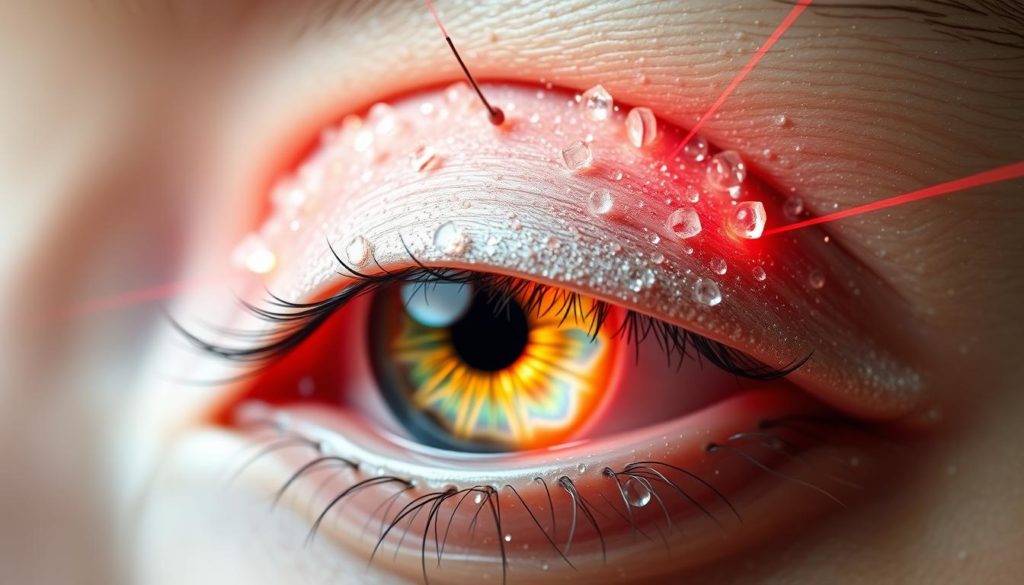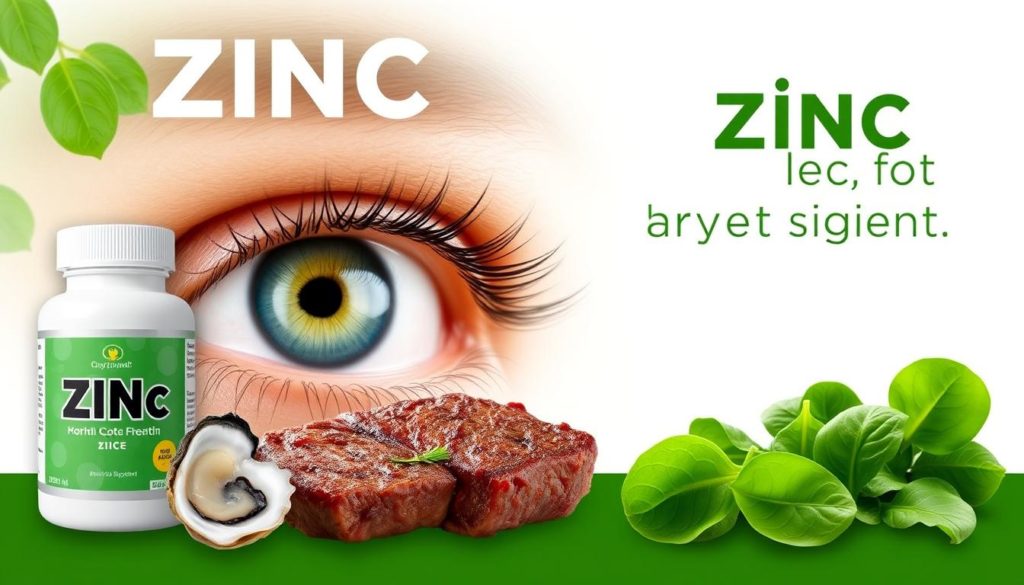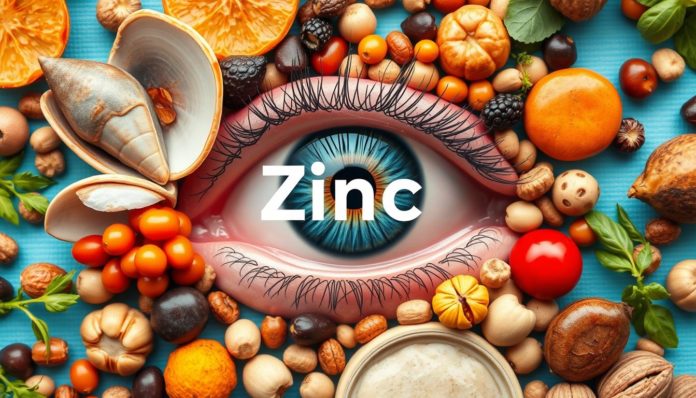Did you know that the macula, in the center of your retina, has high zinc levels? This important mineral is key to keeping your eyes healthy.
Zinc is crucial for your vision and overall health. It helps make melanin, a pigment that protects your eyes. Without enough zinc, your night vision could be affected. But, taking zinc won’t suddenly improve your night vision.
Zinc also helps slow down age-related macular degeneration (AMD) when combined with antioxidant vitamins.
Adult men need 11 milligrams of zinc daily, while women need 8 milligrams. Pregnant and nursing women may need more. But, too much zinc can harm your health by affecting copper levels and reducing antibiotic effectiveness. Always talk to a healthcare professional before starting zinc supplements to improve your vision safely.
Understanding the Importance of Zinc for Eye Health
Zinc is a key mineral for healthy vision. It’s found in the eye’s retina, especially in the macula. Zinc helps with many important functions that keep vision clear and prevent eye diseases. Adding zinc to your diet can greatly improve your eye health now and in the future.
The Role of Zinc in the Eye
Zinc helps keep the eye healthy by making melanin. Melanin protects the eye from damage. Zinc also helps vitamin A make this pigment, showing its importance for vision health. Not having enough zinc can hurt your night vision, making it crucial to keep zinc levels up.

Connection Between Zinc and Vision Protection
Zinc does more than just maintain eye health; it also protects against age-related vision changes. For instance, zinc can slow down age-related macular degeneration when used with antioxidants. This shows how zinc is key for eye care.
Adding zinc to your diet or taking supplements can greatly improve your vision health. Focusing on Zinc for Clear Vision can give you lasting benefits for your eyes.
How Zinc Supports Eye Function
Zinc is a key mineral for eye health. It helps with the eye’s structure and supports many eye functions. Zinc is crucial for keeping vision sharp.
Zinc and Vitamin A Interaction
Zinc and Vitamin A work together well in the eyes. Zinc helps move vitamin A to the retina, where it turns into melanin. Melanin protects the eyes and helps us see in low light.
This team-up is key for making visual pigments needed for seeing in dim light. It’s a big part of keeping eyes healthy.
Melanin Production and Eye Protection
Zinc also helps make melanin in the eyes. Melanin and Vision Health with Zinc are closely linked. This pigment absorbs too much light and protects the eyes.
With enough melanin, the eyes can handle bright light without damage. This keeps vision clear over time.

Zinc’s role in eye health is clear. It’s vital for eye processes, especially with vitamin A and melanin. Zinc’s protective actions highlight its importance in eye care.
Zinc and Age-Related Macular Degeneration (AMD)
Age-related macular degeneration (AMD) is a serious eye condition that affects millions. Getting enough Zinc for Vision is key. The National Eye Institute’s AREDS study found that zinc and antioxidants together can help prevent AMD.
The AREDS study showed that zinc can slow down AMD, the top cause of vision loss in older people. Adding zinc to your diet can make a big difference. When combined with antioxidants, zinc helps protect the macula, the part of the eye most affected by AMD. This can lower the risk of advanced AMD by about 25%.
Let’s look at how zinc affects macular health, based on the AREDS study:
| Supplement | Risk Reduction | Target Group |
|---|---|---|
| Antioxidants + Zinc | 25% | Intermediate AMD |
| Zinc Alone | 19% | Advanced AMD in One Eye |
Studies like the AREDS show that keeping zinc levels right is crucial for preventing AMD. Eating well with lots of antioxidants also helps protect your eyes. Making sure you get enough Zinc for Vision is a smart way to fight age-related eye problems.
Dosage Recommendations for Zinc
Finding the right amount of zinc to take can be hard, but it’s key for staying healthy. The amount you need changes based on who you are. So, getting advice that fits you is important.
Zinc Intake for Different Demographics
The amount of zinc you should take every day changes for men and women, and for pregnant or nursing moms. Here’s a simple guide:
| Group | Recommended Daily Intake |
|---|---|
| Men | 11 milligrams |
| Women | 8 milligrams |
| Pregnant Women | 11 milligrams |
| Nursing Mothers | 12 milligrams |
These amounts are based on what most people in each group need. They help make sure you get enough zinc safely.
Risks of Excessive Zinc Consumption
Taking too much zinc isn’t good. It can mess with how your body absorbs copper and might make some antibiotics less effective. So, it’s important to stick to the right amount to avoid problems.
Consulting with a Doctor about Zinc Supplements
Before taking zinc supplements, talking to a doctor is a good idea. They can give you advice that fits your health needs. This helps you avoid side effects and get the most health benefits.
Natural Food Sources of Zinc for Vision Health
To boost zinc for eye health, add certain foods to your diet. Including foods high in zinc can greatly improve your vision.
Top Zinc-Rich Foods
Getting zinc from food is best for your health. Here are some top foods for vision health:
| Food | Zinc Content (mg per 3 oz) |
|---|---|
| Oysters | 74.0 |
| Beef | 7.0 |
| Lobster | 3.5 |
| Pork | 2.9 |
| Yogurt | 1.7 |
| Zinc-fortified cereals | 3.8 |
| Baked beans | 2.9 |
| Cashews | 1.6 |
Incorporating Zinc-Rich Foods into Your Diet
Getting enough zinc from food is easy and tasty. Adding these zinc-rich foods to your meals is key for eye health.
- Start your day with a bowl of zinc-fortified cereal with yogurt.
- Enjoy an oyster appetizer or a beef main course for your protein-rich meals.
- Snack on cashews or bake beans to get a good dose of zinc.
A balanced diet with these zinc-rich foods helps your vision and overall health. For more info, read this article on eye health and nutrition.
Scientific Evidence Supporting Zinc for Vision
Studies show that zinc is key for eye health. Clinical research on zinc for vision highlights its importance. It helps keep eyes working well and prevents eye diseases.
Findings from Clinical Trials
Clinical trials show zinc’s benefits for vision. A key study found that zinc supplements improved vision in participants. This research proves zinc is vital for eye health and function.
AREDS Study and Its Implications
The Age-Related Eye Disease Study (AREDS) by the National Eye Institute is a major study on eye health. The AREDS study findings showed that zinc and antioxidants lowered the risk of advanced AMD in high-risk groups. This study supports the use of zinc supplements clinical evidence. It shows they help slow AMD and protect vision in older people.
| Study | Key Findings |
|---|---|
| AREDS | Reduced progress to advanced AMD with zinc supplementation |
| Zinc Supplement Trials | Improvement in overall vision quality |
Best Zinc Supplements for Vision
There are many zinc supplements out there, but picking the right one is key for eye health. You can choose from zinc gluconate, zinc sulfate, or zinc acetate. Each type has its own benefits and how well it gets absorbed by the body.
Types of Zinc Supplements
- Zinc Gluconate: It’s popular because it’s easy to absorb and tastes mild.
- Zinc Sulfate: It’s a budget-friendly option that’s easy to find.
- Zinc Acetate: It’s fast to absorb, making it great for quick supplements.
Choosing the Right Zinc Supplement for You
Finding the right zinc supplement is a personal choice. It depends on your health, what you like to eat, and your eye health goals. Getting zinc supplements that fit your needs can make a big difference. Always talk to a healthcare provider to make sure the supplement is right for you and your diet.
Combining Zinc with Other Nutrients for Optimal Eye Health
Getting the best eye health is more than just eating zinc. Adding nutrients like antioxidants and vitamins A, C, and E is key. These nutrients help protect your eyes and fight eye diseases.
Antioxidants and Their Role
Antioxidants are vital for eye health. They fight oxidative stress, which can harm your eyes. When zinc and antioxidants work together, they lower the risk of eye diseases like AMD and cataracts.
Antioxidants like vitamin C and E stop free radicals from damaging your eyes. These free radicals can hurt the retina and other eye tissues.
Vitamins A, C, and E
Vitamins and Minerals for Eyes are key for good vision. Vitamin A is crucial for the cornea and helps in low light. With zinc, vitamin A works even better, improving eye health.
Vitamin C keeps blood vessels in the eyes healthy. It lowers the risk of cataracts and AMD. Vitamin E also acts as an antioxidant, protecting eye cells from damage. Zinc makes these vitamins work better together, supporting your vision fully.
Eating a balanced diet with these Vitamins and Minerals for Eyes gives your eyes the best protection. This approach shows how different nutrients work together for eye health.
Potential Side Effects of Zinc Supplementation
Zinc is key for eye health, but it’s important to know the side effects of too much zinc. Too much zinc can mess with copper levels, leading to copper deficiency. This can cause anemia and weaken your immune system.
Too much zinc can also upset your stomach. You might feel nauseous, vomit, or have diarrhea. It’s key to follow the right dosage and talk to a doctor, especially if you have health issues or take other meds. The AREDS study showed that zinc is mostly safe, but it can cause some stomach problems.
Zinc can also interact badly with some medicines. It can affect how antibiotics and diuretics work. If you’re thinking about taking zinc for eye health, talk to your doctor first. They can help you use zinc safely and effectively. Knowing about Zinc Safety helps you take care of your eyes the right way.
FAQ
What role does zinc play in eye health?
Zinc is a key mineral found in the eye’s macula. It helps make melanin, a pigment that protects the eyes. Zinc also boosts the immune system and supports overall health.
How does zinc protect against age-related macular degeneration (AMD)?
Zinc, along with antioxidants, can slow down AMD. The AREDS study showed that these nutrients reduced AMD risk by about 25%.
What are the recommended daily intakes of zinc?
Adult men need 11 milligrams of zinc daily. Women need 8 milligrams. Pregnant women should get 11 milligrams, and nursing mothers 12 milligrams. Always talk to a healthcare professional for advice tailored to you.
Can consuming too much zinc have adverse effects?
Yes, too much zinc can block copper absorption and lessen the effect of some antibiotics. It may also cause stomach problems. Always check with a healthcare provider before starting supplements.
What are some natural food sources of zinc that benefit vision health?
Oysters, beef, lobster, pork, yogurt, and zinc-fortified cereals are great for zinc. Baked beans and cashews are also good sources. Eating these foods helps keep your zinc levels right for your vision.
What scientific evidence supports the use of zinc for eye health?
The AREDS study showed that zinc and antioxidants can lower the risk of advanced AMD. This study proves zinc supplements are good for eye health.
What are the best zinc supplements for vision health?
There are many zinc supplements like zinc gluconate, sulfate, and acetate. Choose the right one for your health and diet. Always talk to a healthcare provider before starting supplements.
How does zinc work together with other nutrients to support eye health?
Zinc teams up with vitamins A, C, and E to fight oxidative stress and keep eye cells healthy. This mix helps prevent eye diseases and supports vision health.
Are there potential side effects of zinc supplementation?
Zinc is vital but can cause issues if not taken right. These include problems with copper levels, stomach discomfort, and interactions with other medicines. Always talk to a healthcare provider to avoid these side effects.


